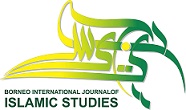Muslim Feminists` Reading of the Quran: A Juristic Analysis on Family Law Issues
Abstract
Muslim feminist movement represents an indigenous voice among the contemporary literature on women and family. Its main contention is that women in Muslim society are accorded less favourable treatment especially in terms of legal rights. To remedy the situation, feminist scholarship`s main argument is that there is a need for feminist-reading of the sacred texts so as to purge the juristic legacy of male-biased views and achieve justice and equality for Muslim women in contemporary families. One principal methodological framework for this idea to materialise is to embark on the re-reading of the Qur`an from the women`s perspective. In this context, this paper presents issue-based analysis of Amina Wadud`s reading of the relevant Qur`anic passages on family law matters and finds that in spite of its merits, its main handicap lies on its methodological flaws, both in terms of approach and outcome. Methodologically, it is regarded as selective and ultra-vires of Islamic methodology of legal reform. It terms of impact, it is suspected as being tainted with Western inspired assumptions of rights in terms of justice and equality between the genders. To overcome this impasse, the paper argues for a mediated holistic approach to harmonise relations between men and women in the family.
Keywords: Family law, gender equality, justice, Muslim feminist.
References
Al-Qurthubi, Abu Abdillah ibn Ahmad al-Anshari. Al-Jāmi’ Li Ahkāmi Al-Qur’ān. Vol. 6. Beirut: Dār al-Kutub al-‘Ilmiyyah, 2004.
Anwar, Zainah. “Malaysia: Advocacy for Women’s Rights Within the Islamic Framework | Women Reclaiming and Redefining Cultures.” Accessed July 10, 2018. http://www.wluml.org/node/1186.
AR, Zurairi. “Muslim Women’s Group to Challenge Fatwa against Liberalism, Pluralism | Malay Mail.” Accessed July 10, 2018. https://www.malaymail.com/s/773695/muslim-womens-group-to-challenge-fatwa-against-liberalism-pluralism.
Haneef, Sayed Sikandar. “Treatment of Recalcitrant Wife in Islamic Law: The Need for a Purposive Juridical Construct.” Global Jurist 12, no. 2 (2012). https://doi.org/10.1515/1934-2640.1399.
Hassan, Riffat. “Equal Before Allah? Woman-Man Equality in the Islamic Tradition | Women Reclaiming and Redefining Cultures.” Accessed July 10, 2018. http://www.wluml.org/node/253.
Hibri, Azizah al-. “An Islamic Perspective on Domestic Violence.” Fordham International Law Journal 27, no. 1 (January 1, 2003): 195.
Ibn Qayyim, Shams al-Dīn Abū ʿAbd Allāh Muḥammad ibn Abī Bakr ibn Ayyūb. Al-Turuq Al-Hukmiyyah. Maktabat Dār al-Bayan, 2010.
Kadivar, Mohsen. “Revisiting Women`s Rights in Islam.” In Gender and Equality in Muslim Family Law. Ziba Hossieni, Kari Vogt (Ed). New York: I.B. Tauris and Co Ltd, 2013.
Mir-Hosseini, Ziba. “Feminist Voices in Islam: Promise and Potential.” openDemocracy. Accessed July 10, 2018. http://www.opendemocracy.net/5050/ziba-mir-hosseini/feminist-voices-in-islam-promise-and-potential.
Mirza, Qudsia. “Islamic Feminism and Gender Equality.” Accessed July 10, 2018. https://www.academia.edu/35703510/Islamic_Feminism_and_Gender_Equality.
Mustafa, Md. Jamal. Islamic Law and Society. London: Koros Press Limited, 2012.
Wadud, Amina. Qur’an and Woman: Rereading the Sacred Text from a Woman’s Perspective. Oxford University Press, 1999.
Yelwa, Mansur Isa. “Inter-Gender Balance of Right in Islam.” In Issues on Harmonization of Human Rights in Islam. Sayed Sikandar Shah Haneef et.Al (Ed). Kuala Lumpur: IIUM Press, 2015. http://iiumpress.iium.edu.my/bookshop/issues-on-harmonization-of-human-rights-in-islam-2.


.png)






